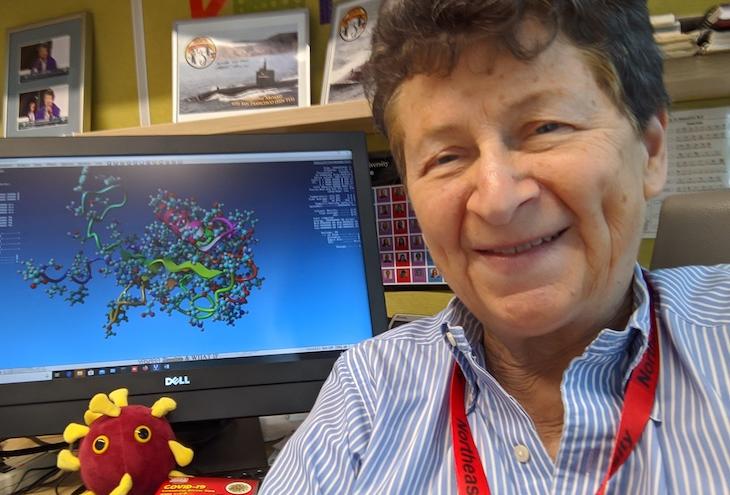Enlisting her decades-long research skills, Dr. Mary Jo Ondrechen is all in for the fight to understand — and ultimately defeat — the coronavirus. Dr. Ondrechen and her team are researching the SARS-CoV-2 virus, which causes COVID-19, at her laboratory at Northeastern University in Boston, where she is a professor of chemistry and chemical biology and principal investigator of the Computational Biology Research Group.
Her ground-breaking research is funded by a National Science Foundation (NSF) grant, awarded last May. Dr. Ondrechen and her team are working to identify the amino acids in the viral proteins responsible for the activity of each protein type in this particular coronavirus that thrives at the expense of human cells. With research collaborator Dr. Penny Beuning, also a professor of chemistry and chemical biology at Northeastern, Dr. Ondrechen is using computational and machine-learning methods she developed to achieve a better understanding of SARS-CoV-2. They are predicting compounds that could disrupt the viral life cycle, and Dr. Beuning’s group is testing them in vitro — findings that could lead to new drugs to treat COVID-19.
Though the grant is for one year, Dr. Ondrechen hopes to complete most of her research within six months. “We developed a theory to enable the interpretation of the genomic data and apply the theory to where in the structures of the viral proteins we can attach molecules with an effort to actually diminish its capacity to infiltrate human cells or to disrupt its ability to replicate in our cells,” she explains.
Her work represents a potential opportunity to counterpunch a deadly pandemic. A second NSF grant provided a chance to offer virtual summer research internships to eight undergraduate students, two of whom are Indigenous, under the Research Experiences for Undergraduates program. “This pandemic is hard on Native students, as the infection and death rates are higher in some tribal communities due to severely limited resources, such as access to clean running water, while internships and summer research opportunities have been cancelled due to the pandemic and travel-related restrictions,” Dr. Ondrechen explains.
The plight of Native students resonates with Dr. Ondrechen, who values her Mohawk heritage and embodies a traditional deep appreciation for nature. A cultural highpoint for her is the annual Echoes of a Proud Nation Pow Wow held on the Kahnawake Mohawk Territory, a First Nations reserve, just a short distance from Montreal.
It was her mother, says Dr. Ondrechen, who fostered her initial interest in science. “It all started when my mom took us to a weekend science course where we studied everything from animals to rocks. Every week was a different topic,” she recalls. “When a parent goes with their child to these types of learning experiences, the family often talks about it during dinner. That’s when my fascination with science really began.”
She believes that Natives are a natural fit for STEM careers. “We are excellent observers of nature and defenders of our natural resources,” she points out. “The water, land, plants, and animals are part of a balanced system, and it’s our job to protect those things. You have to give back because nature sustains us.”
Dr. Ondrechen has been active in AISES for many years and has served in a variety of capacities, including as chair of the Board of Directors and as a mentor for the Lighting the Pathway to Faculty Careers for Natives in STEM program, which helps inspire and train undergraduate, graduate, and postdoctoral students to become college and university professors.
Besides pushing to help defeat COVID-19, she is working on two other research grants. One from the NSF involves machine learning to interpret the functional roles of amino acids in proteins to explain genomic data, and another from the ALS Association is for developing a novel approach to treating amyotrophic lateral sclerosis, a fatal neurodegenerative condition also known as Lou Gehrig’s disease. Dr. Ondrechen is also the director of a project funded by the Howard Hughes Medical Institute to catalyze institutional change to encourage natural science majors to be more welcoming of non-traditional students, including minorities and first-generation college students.
Dr. Ondrechen completed her bachelor of science degree in chemistry at Reed College in Portland, Ore., and went straight for her doctorate in physical chemistry at Northwestern University. She has authored and coauthored dozens of scientific research papers. She continues to enjoy mentoring and encouraging students at all levels through webinars, one-on-one meetings, talking circles, and conferences. This is her 40th year as a Northeastern University faculty member, and she continues to find her work compelling. “It’s a wonderful life working with young people,” she says. “New discoveries are always around the next corner.”













